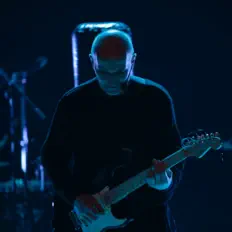
Rock
Телевизор
O umělci Телевизор

Žánr
Rock
Of the many groups that came of age amid the creative ferment of perestroika, Televizor, more than any of their contemporaries, put to the test the Soviet regime's lenient new policies toward artistic expression. Starting in 1984 the group became a regular presence on the stage of the Leningrad Rock Club, dodging censorship with hits like "Tvoy Papa Fashist" (Your Dad's a Fascist) and "Byiyti iz-pod Kontrolya" (Escape from Control). Despite their dubious ideological messages, at the peak of their fame in 1987 they became one of the most famous rock groups in the Soviet Union, sharing venues with Soviet supergroups like Aquarium, Kino, and Alisa. Musically, they engineered a new brand of electronic funk that would forever change the face of Russian rock.
Televizor were formed in March of 1984 by Mikhail Borzykin, who gathered the bandmembers from the lineups of other local Leningrad groups including Ikar (Icarus) and Ozero (Lake). The founding lineup included Borzykin (keyboard, vocals), Aleksandr Belyaev (guitar), Igor Petrov (guitar), Igor Kopylov (bass guitar), Vyacheslav Arhipov (drums), and sound producer Sergei Osipov. In this configuration Televizor quickly ascended to celebrity, gathering a number of awards at festivals where they were commended for their new wave aesthetic, which -- though minimalistic -- preserved the lyrical and romantic elements so vital to the Russian songwriting tradition. In line with new freedom that allowed not only artists but regular citizens more opportunity for choice in their daily lives, Televizor's lyrics dealt with complex and multifaceted subjects. Lead singer Borzykin was repeatedly compared to rock luminary Viktor Tsoi.
In 1985 at the studio of famed producer Andrei Tropillo, Televizor recorded their debut, Shestvie Ryb (Procession of Fish). In June of 1986 the group was the subject of a scandal after it performed two songs whose lyrics had not been cleared by the committee for censorship. The songs -- the aforementioned "Byiyti iz-pod Kontrolya" and "My Idyom" (We're Going) -- contained barefaced critiques of oppressive rule by the Soviet regime (with lyrics like "To escape from control/To escape and sing about what we see/Not what we're allowed to/We have the right to protest!"). The incident was the straw that broke the back of the Soviet censorship establishment, proving that artists were now and forever above the law, free to perform and face the consequences. Though Televizor were banned in a few cities, for the most part the group remained unscathed. They became notorious for an anarchic image that they fought to uphold.
But just as the dust around the incident was settling, a majority of the bandmembers found other occupations. The departing members were replaced by drummer Aleksei Ratsen and keyboardist Igor Babanov, who quickly whipped the group back into shape with a new program of sharply judgmental social and political compositions. These songs spawned 1987's Otechestvo Illuzi (Homeland of Illusion), the band's most critically acclaimed and best-selling album. Featuring only the most minimal arrangements and instrumentation, the ascetic record was carried by Borzykin's bellicose vocals and controversial poetry. When questioned about the album's unadorned style, the bandleader responded, "I am passing along information."
In 1988 Televizor performed widely in the Soviet Union and in Europe. At home the group had been harshly upbraided for its politicized image and lack of melodic cohesion (the establishment had long been dominated by trite state-sanctioned pop tunes). But in Europe these traits were embraced as an affirmation of Soviet brutality toward arts and culture. The same year they recorded the album Otchuzhdenie (Alienation), which, because of a spoiled relationship with its producer, would not see the light for years to come. They took the experience as an impetus to open their own studio, where they worked with a number of prominent Leningrad artists like Boris Grebinshikov, Nautilus Pompilius, and Kolibri. In 1989 Televizor veteran Aleksandr Belyaev left the group in favor of Nautilus Pompilius, and was promptly replaced by hard rocker Maksim Kuznetzov. The next couple of years were spent touring and supporting various causes, including the movement for ecological awareness in music. In 1991 another album, Mechta Camoubuytzy (The Suicide Victim's Dream), was released, but that year also brought the dismantling of the group as a result of strained relationships among its members.
However, during the next year Televizor regrouped, resulted in three more albums: 1992's Dym-Tuman (Smoke and Fog), 1994's Zhivoy (Alive), and 1995's Dvoe (Two). Like many reincarnated rock groups, in the '90s the band suffered from continual lineup changes, throughout which Borzykin was the only constant. The group's seventh album, entitled 7B, was basically a solo effort by the artist. Two other musicians who have appeared regularly in Televizor's late career are guitarist Sergei Sibikiy and drummer Sergei Rusanov. In the new millennium the group has released two more albums, 2002's Put' k Uspehu (Road to Success) and 2004's MegaMizantrop (MegaMisanthrope). ~ Sabrina Jaszi
Podobné jako: Телевизор
Objevte další hudbu a umělce podobné umělci Телевизор, jako je Televizor, Урфин Джюс, Zvuki Mu












